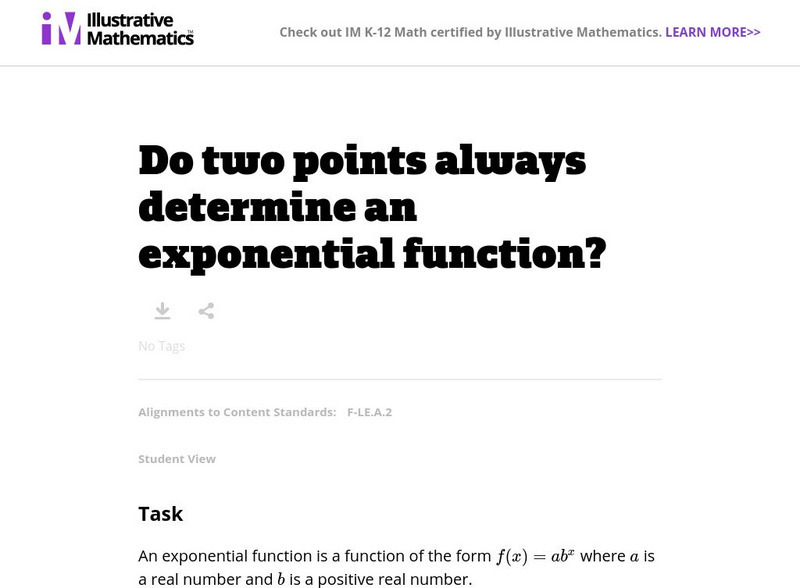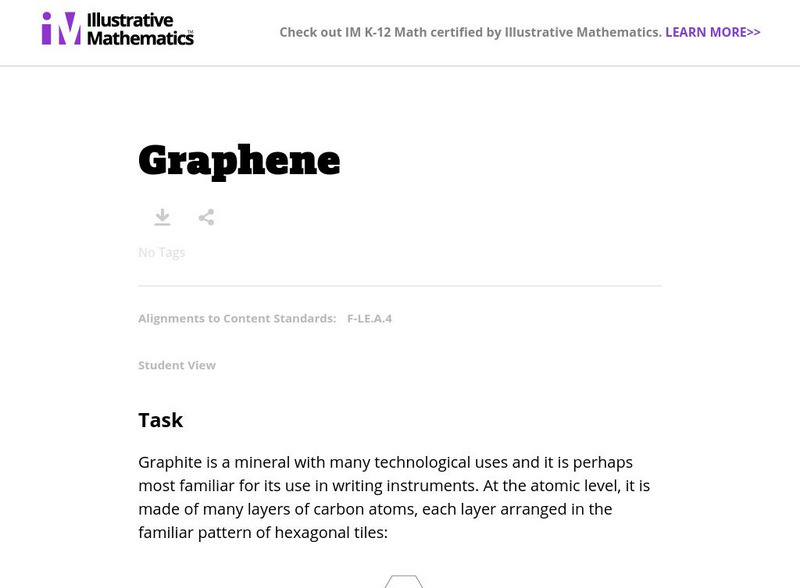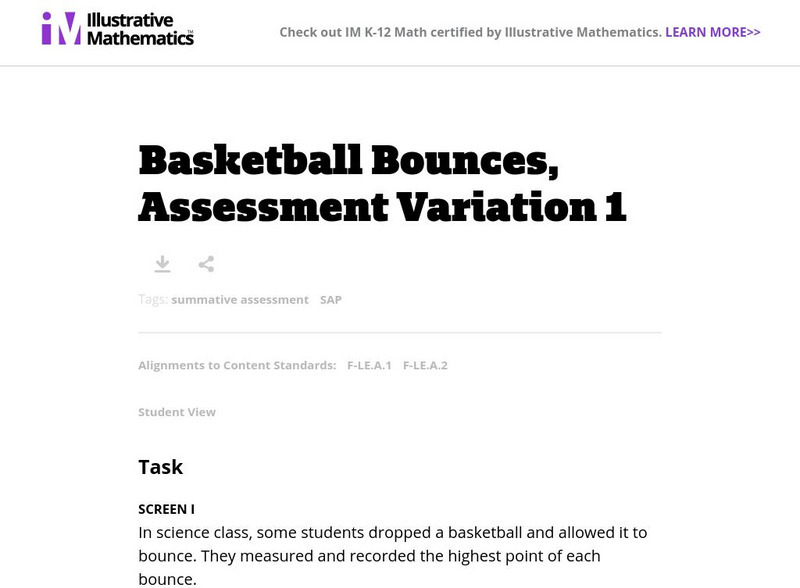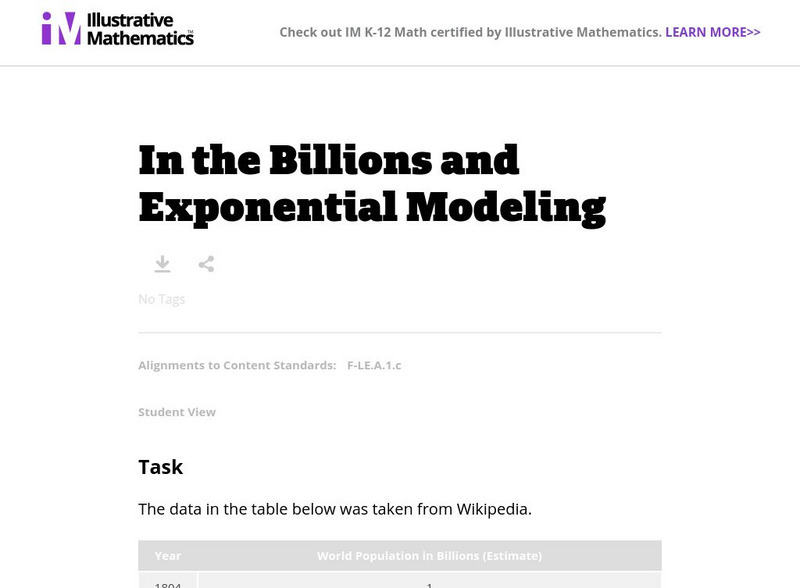Illustrative Mathematics
Sharing Prize Money
When three classrooms are to split up prize money, your mathematicians must find the percentage that each class deserves and calculate the total amount. There is an option to use a calculator and practice rounding.
Illustrative Mathematics
Sale!
Everyone loves a sale, and this worksheet allows learners to calculate which sale is more rewarding. The activity can be adapted for different thinking contexts. The answer key describes different answer choices, some being higher...
Illustrative Mathematics
Buying Protein Bars and Magazines
Packing for a trip? This activity allows learners to decide how many magazines and protein bars they can buy with twenty dollars. They can organize their work in a chart to track how many items they can purchase. There are two different...
Illustrative Mathematics
“One More” Concentration
Help your primary learners develop an understanding of the concept of one more and one less using two sets of number cards. The first set of cards, all in one color, is the "one less" deck. The second set, again all in one specific...
Illustrative Mathematics
Dilating a Line
High School geometers verify through experimentation certain properties about dilations. This multi-step problem challenges them to construct examples of dilations to verify specific facts, the final step provides an opportunity to more...
Illustrative Mathematics
Equivalent fractions approach to non-repeating decimals
Trying to get your class to think of decimals as fractions and vice versa can lead to interesting discussions. After all, we can usually understand quickly that 1/4 is .25 but why is 1/7 not so easy to convert? This activity looks...
Illustrative Mathematics
Adding Tenths and Hundredths
Learning to add fractions with different denominators presents a big hurdle for many young mathematicians. Simplify the process for learners with this series of practice problems involving the friendly fractions tenths and hundredths....
Illustrative Mathematics
Delivering the Mail
A mail truck travels the same amount of miles per day. It will be up to your algebra learners to find an equation for this mailman’s truck. One needs a good understanding of rate of change and the initial value for this model. The...
Illustrative Mathematics
Bike Race
A graph not only tells us who won the bike race, but also what happened during the race. Use this resource to help learners understand graphs. The commentary suggests waiting until the end of the year to introduce this topic, but why...
Illustrative Mathematics
Applying the Pythagorean Theorem in a Mathematical Context
Participants who use this resource will apply the Pythagorean Theorem to show whether or not the shaded triangle inscribed in a rectangle is a right triangle. Once all of the sides on the shaded triangle are found, it is important that...
Illustrative Mathematics
Two Lines
Here is a resource that helps your algebra learners understand the connection between the graph of two lines, the equations of lines, and the solutions and intersecting points of lines. It would make a great assessment question, but can...
Illustrative Mathematics
Baseball Cards
Here is a resource that demonstrates growth and the initial state of an equation. In this case, your class will be looking at baseball collections. How many baseball cards did the collector start out with, and how many were added or...
Illustrative Mathematics
Tax and Tip
Finding out how to calculate tax and tip is a valuable skill that all young adults should be able to do without a calculator. Learners are given a bill and asked to calculate the tax, tip, and total amount. Calculations can be exact or...
Illustrative Mathematics
Accuracy of Carbon 14 Dating I
Here is an activity that is intended to highlight a very important issue about precision in reporting and understanding statements in a realistic scientific context. Discuss different ways of reporting the half life of Carbon 14...
Illustrative Mathematics
High Blood Pressure
Does watching TV increase one's blood pressure? Assess student understanding of how study design dictates whether a conclusion of causation is warranted. Use this as a prompt for a small group or whole class discussion, or as a part of a...
Illustrative Mathematics
Cynthia's Perfect Punch
Using a real-world example, this problem illustrates the thought process that learners need to engage in to understand adding mixed numbers with common denominators. First by looking at estimation, and then by drawing models that...
Illustrative Mathematics
Illustrative Mathematics: F Le Do Two Points Determine an Exponential Function?
In this task, students investigate whether exponential functions will always be determined by two points. It complements the task "Do two points always determine a linear function?" Aligns with F-LE.A.2.
Illustrative Mathematics
Illustrative Mathematics: F Le.4 Graphene
This task provides a real-world context for examining the power of exponential growth and decay. Students experiment, at the macro level, using scotch tape to pull a chip of graphite apart into two pieces. They are asked to find about...
Illustrative Mathematics
Illustrative Mathematics: F Le a Valuable Quarter
The context of this task is that a quarter was put into a bank account in 1901 and students are asked to calculate its value in 2013 at two different interest rates. Those amounts are compared to the appreciation rate of a rare and...
Illustrative Mathematics
Illustrative Mathematics: F Le Basketball Bounces, Assessment Variation 1
This task asks students to analyze a set of data about the height of a basketball for each time it bounces. They choose a model that reasonably fits the data and use the model to answer questions about the physical context. This variant...
Illustrative Mathematics
Illustrative Mathematics: F Le Rising Gas Prices Compounding and Inflation
In this task, students explore exponential models in the context of a real-world problem. Students learn about price inflation for a single commodity and are introduced to the Consumer Price Index for measuring the inflation of a body of...
Illustrative Mathematics
Illustrative Mathematics: F Le Basketball Bounces, Assessment Variation 2
This task asks students to analyze a set of data about the height of a basketball for each time it bounces. They choose a model that reasonably fits the data and use the model to answer questions about the physical context. This second...
Illustrative Mathematics
Illustrative Mathematics: F Le Carbon 14 Dating in Practice Ii
This problem introduces Carbon 14 dating which is used by scientists to date certain organic material. This version is based on the ratio of Carbon 14 to Carbon 12, which decreases at a constant exponential rate after an organism dies....
Illustrative Mathematics
Illustrative Mathematics: F Le in the Billions and Exponential Modeling
For this task, students examine world population data from 1804 to 2012 and investigate whether an exponential function is appropriate for modeling the relationship between the world population and the year. Aligns with F-LE.A.1.c.

























